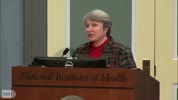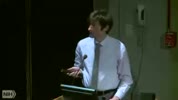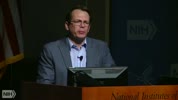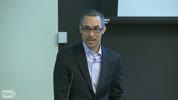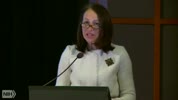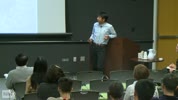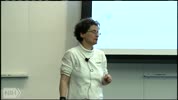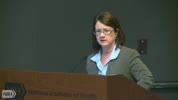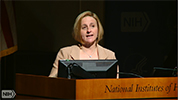-
- NIH VideoCast - Great Teachers: Haploinsufficiency Causing Human Inflammatory Disease: When One Gene is Not Enough
-
- - John P. Atkinson, MD, Chief, Division of Rheumatology and Samuel B. Grant Professor of Medicine, Washington University School of Medicine, St. Louis, MO (2015/03/31)
- - Category : Clinical Center Grand Rounds
- Contemporary Clinical Medicine: Great Teachers
The NIH Clinical Center 2015 Distinguished Clinical Research Scholar and Educator in Residence Lecture
Haploinsufficiency Causing Human Inflammatory Disease: When One Gene is Not Enough
For more information go to http://www.cc.nih.gov/about/news/grcurrent.html
NIH VideoCast - Great Teachers: Haploinsufficiency Causing Human Inflammatory Disease: When One Gene is Not Enough
-
- NIH VideoCast - The Nightlife of the Brain
-
- - Maiken Nedergaard, M.D., D.M.Sc., Frank P. Smith Professor, Neurosurgery, and Co-Director, Center for Translational Neuromedicine, University of Rochester Medical Center (2015/03/31)
- - Category : WALS - Wednesday Afternoon Lectures
- NIH Wednesday Afternoon Lecture
Dr. Nedergaard and her colleagues recently described a macroscopic pathway in the central nervous system: the glymphatic system, which facilitates the clearance of interstitial waste products from neuronal metabolism. The glymphatic clearance of macromolecules is driven by cerebrospinal fluid (CSF) that flows along para-arterial spaces and through the brain parenchyma via support from astroglial aquaporin-4 water channels. The glymphatic circulation constitutes a complete anatomical pathway: para-arterial CSF exchanges with the interstitial fluid, solutes collect along para-venous spaces, and then drain into the vessels of the lymphatic system for ultimate excretion from the kidney or degradation in the liver. Because the glymphatic system is only active during sleep, it represents a novel and unexplored pathway for understanding the biological necessity for sleep.
For more information go to http://wals.od.nih.gov
NIH VideoCast - The Nightlife of the Brain
-
- NIH VideoCast - Building a Large U.S. Cohort for Precision Medicine Research (Day 2)
-
- - National Institutes of Health (2015/03/31)
- - Category : Conferences
- On February 11-12, NIH will host a workshop to discuss the opportunities and challenges around building a large research cohort focused on precision medicine. We look forward to hearing from leading experts from many disciplines and sectors.
For more information, visit
http://www.nih.gov/precisionmedicine/workshop.htm
NIH VideoCast - Building a Large U.S. Cohort for Precision Medicine Research (Day 2)
-
- NIH VideoCast - National Cancer Advisory Board Meeting - February 2015
-
- - NCI, NIH (2015/03/31)
- - Category : National Cancer Advisory Board
- The 3rd Virtual meeting of the National Cancer Advisory Board
NIH VideoCast - National Cancer Advisory Board Meeting - February 2015
-
- NIH VideoCast - MD2K: Mobile Data to Knowledge
-
- - Santosh Kumar, PhD, University of Memphis (2015/03/31)
- - Category : Special
- MD2K is one of 11 national Big Data Centers of Excellence awarded by the National Institutes of Health (NIH) as part of its Big Data-to-Knowledge initiative. The MD2K Center brings together expertise in Computer Science, Engineering, Medicine, Behavioral Science, and Statistics. The MD2K Team is developing innovative tools to make it easier to gather, analyze and interpret health data generated by mobile and wearable sensors. The goal of the big data solutions being developed by MD2K is to reliably quantify physical, biological, behavioral, social, and environmental factors that contribute to health and disease risk. The research conducted by MD2K is expected to improve the health of individuals through early detection of adverse health events and by facilitating prevention. The approach and product of MD2K will be also applicable to other complex diseases, such as asthma, substance abuse and obesity. The Center will make the MD2K tools, software, and training materials widely available and organize workshops and seminars to encourage their use by researchers and clinicians.
NIH VideoCast - MD2K: Mobile Data to Knowledge
-
- NIH VideoCast - Telomere DNA Repair and Joint Molecule Resolution
-
- - Yie Liu, Ph.D., Senior Investigator, Laboratory of Molecular Gerontology, NIA, NIH (2015/03/31)
- - Category : NIH Director`s Seminars
- NIH Director`s Seminar Series
Telomeres are chromosome end capping structures. Critical shortening or over-lengthening of telomeres leads to a DNA damage response or delays in DNA replication, resulting in genome instability. It is believed that owing to its G-rich sequence, telomeres are especially susceptible to oxidative DNA damage, and also to formation of alternative DNA forms, both of which may impact telomere maintenance.
We investigate the hypothesis that oxidative DNA damage, inadequate DNA repair and aberrant DNA intermediate resolution would impact telomere maintenance and function. Using a combination of molecular, genetic, and biochemical approaches, we are probing the following questions: (1) the impact of oxidative stress and DNA damage on telomere maintenance, and its mechanistic basis; (2) the key genes that modulate reactive oxygen species (ROS) levels, oxidative DNA damage, and unique joint DNA intermediates at telomeres; and (3) the contributions of oxidative DNA damage and DNA repair/resolution deficiency to telomere defects in aging and cancer.
NIH VideoCast - Telomere DNA Repair and Joint Molecule Resolution
-
- NIH VideoCast - Systems Science & Global Obesity Prevention Center at Johns Hopkins
-
- - Joel Gittelsohn, PhD, Global Obesity Prevention Center at Johns Hopkins (2015/03/31)
- - Category : BSSR - Behavioral and Social Sciences
- BSSR Lecture Series
The B???More Healthy Communities for Kids (BHCK) has designed a multi-level intervention for obesity prevention for low-income African American children in Baltimore, Maryland. Dr. Gittelsohn will discuss the use of computational modeling to simulate the potential impact of programs and policies for reducing children???s obesity risk. Using agent-based modeling, they have developed a virtual representation how low income Baltimore children behave in their food environment, including dietary and physical activity choices. Key institutions within this model (corner stores, carryouts, recreation centers) can be impacted by different intervention strategies.
Dr. Gittelsohn???s lecture, Simulation Modeling to Support a Multi-Level Obesity Prevention Program in Baltimore City, is part of the 2014-2015 BSSR Lecture Series to promote open and engaged discussion about cutting edge research in the behavioral and social sciences field.
For more information go to http://obssr.od.nih.gov
NIH VideoCast - Systems Science & Global Obesity Prevention Center at Johns Hopkins
-
- NIH VideoCast - Make the DASH to Heart Health
-
- - Kathryn McMurry, MS, NHLBI, NIH (2015/03/31)
- - Category : Focus on You Wellness
- Focus on You Wellness Lecture Series
In celebration of American Heart Month, learn steps you can take toward heart-healthy eating. Ms. Kathryn McMurry, M.S., with the National Heart, Lung, and Blood Institute (NHLBI), will present "Make the DASH to Heart Health" based on NIH-funded research.
Ms. McMurry is the Nutrition Coordinator at NHLBI and leads their efforts to promote greater communication regarding all nutrition-related activities and represents the NHLBI on internal and external nutrition committees such as the NIH Nutrition Coordinating Committee and the Dietary Guidelines Alliance.
The "Focus on You" Lectures are sponsored by the Office of Research Services (ORS), Division of Amenities and Transportation Services (DATS) in partnership with the NIH Health and Wellness Council and NHLBI.
NIH VideoCast - Make the DASH to Heart Health
-
- NIH VideoCast - CC Grand Rounds: Clinicopathologic Grand Rounds: Clinical Cases from the NIH Clinical Center: Recombinant Anti-CD22 Immunotoxin Therapy of Drug-Resistant Hairy Cell Leukemia: Eradication of Minimal Residual Disease Without Chemotherapy Toxicity
-
- - Lead Presenters: Ira Pastan, MD Co-Chief, Laboratory of Molecular Biology, NCI, NIH and Robert J. Kreitman, MD Chief, Clinical Immunotherapy Section, Laboratory of Molecular Biology, NCI, NIH (2015/03/31)
- - Category : Clinical Center Grand Rounds
- CC Grand Rounds: Clinicopathologic Grand Rounds: Clinical Cases from the NIH Clinical Center: Recombinant Anti-CD22 Immunotoxin Therapy of Drug-Resistant Hairy Cell Leukemia: Eradication of Minimal Residual Disease Without Chemotherapy Toxicity
For more information go to http://www.cc.nih.gov/about/news/grcurrent.html
NIH VideoCast - CC Grand Rounds: Clinicopathologic Grand Rounds: Clinical Cases from the NIH Clinical Center: Recombinant Anti-CD22 Immunotoxin Therapy of Drug-Resistant Hairy Cell Leukemia: Eradication of Minimal Residual Disease Without Chemotherapy Toxicity
-
- NIH VideoCast - Autism: New Mutations, Genes, and Pathways
-
- - Evan Eichler, Ph.D., Professor, Department of Genome Sciences, University of Washington, and Investigator, Howard Hughes Medical Institute (2015/03/31)
- - Category : WALS - Wednesday Afternoon Lectures
- NIH Wednesday Afternoon Lecture Series
Dr. Eichler will summarize his recent findings regarding the discovery of new genes and genetic mutations that contribute to autism spectrum disorder (ASD) and developmental delays. The lecture will highlight the identification of rare disruptive mutations using copy-number variation from exome- and genome-sequencing approaches on thousands of individuals. He proposes that the early development of the brain is particularly sensitive to the timing and expression of many different genes; multiple genetic perturbations within specific neurodevelopmental pathways can lead to disease with varying severity and predict clinical subtypes of autism. Dr. Eichler will present data on how grouping patients based on a specific gene can be used to predict clinical subtypes of autism. The flood of recent data and candidates provides a powerful path forward for understanding the genetic basis of autism.
For more information go to http://wals.od.nih.gov
NIH VideoCast - Autism: New Mutations, Genes, and Pathways
-
- NIH VideoCast - NIH Academy Roundtable 3 - Policy, Health Reform, and Health Disparities
-
- - Daniel Dawes, Morehouse School of Medicine (2015/03/31)
- - Category : Career Development/OITE
- The NIH Academy provides trainees with an overview of the scientific, social, economic, cultural, environmental, and policy factors that contribute to health disparities. This lecture focuses on the role of health reform in combating health disparities.
For more information go to https://www.training.nih.gov
NIH VideoCast - NIH Academy Roundtable 3 - Policy, Health Reform, and Health Disparities
-
- NIH VideoCast - Optimizing FDA`s Regulatory Oversight of Next Generation Sequencing Diagnostic Tests
-
- - FDA (2015/03/31)
- - Category : Conferences
- The purpose of this workshop is to discuss and receive feedback from the community on FDA???s regulatory approach to diagnostic tests for human genetics or genomics using Next Generation Sequencing (NGS) technology.
NIH VideoCast - Optimizing FDA`s Regulatory Oversight of Next Generation Sequencing Diagnostic Tests
-
- NIH VideoCast - Molecular mechanisms of neuronal polarization
-
- - Kang Shen, Ph.D., Stanford University (2015/03/31)
- - Category : Neuroscience
- Neuroscience Seminar Series
Shen???s laboratory is interested in understanding the molecular mechanisms of neural circuit assembly. They are studying a number of key cell biological questions during the development and maintenance of neural circuits. Although they have traditionally focused on mechanisms of synaptic specificity and synapse assembly, their recent work has also started to shed light on the mechanisms of axonal transport, neuronal cytoskeletal polarity, and dendrite branching.
1. Axon guidance cues can pattern synapses by inhibiting synaptogenesis and maintenance.
2. Cellular and molecular mechanisms of synaptic specificity in vivo.
3. Molecular mechanisms of presynaptic assembly in vivo.
4. Interaction of active zone proteins and synaptic vesicles (SV) dictate the trafficking of SV and the size of synapses.
5. Molecular regulation of the intracellular trafficking of synaptic vesicles.
6. Molecular mechanisms of microtubule polarity in neurons.
7. Molecular mechanisms of dendrite branching and growth.
NIH VideoCast - Molecular mechanisms of neuronal polarization
-
- NIH VideoCast - The Academic Job Search: Evaluating Positions and Negotiating Offers
-
- - Sharon Milgram, PhD, Director, OITE, NIH (2015/03/31)
- - Category : Career Development/OITE
- So you`ve got the job offer! Now what do you do! In this workshop, learn what you should consider when beginning negotiations. Also, learn what you can and cannot negotiate and hear strategies for clearly articulating your wants and needs.
For more information go to https://www.training.nih.gov
NIH VideoCast - The Academic Job Search: Evaluating Positions and Negotiating Offers
-
- NIH VideoCast - NIMHD Advisory Council February 2015
-
- - NIMHD, NIH (2015/03/31)
- - Category : Advisory Board Meetings
- February 2015 NIMHD Advisory Council meeting.
NIH VideoCast - NIMHD Advisory Council February 2015
-
- NIH VideoCast - Demystifying Medicine 2015 - Marijuana: the Highs and Lows
-
- - Nora Volkov, MD, PhD, NIDA, NIH and George Kunos, MD, PhD, NIAAA, NIH (2015/03/31)
- - Category : Demystifying Medicine
- The 2015 Demystifying Medicine Series, which is jointly sponsored by FAES and NIH, will begin January 6th and includes the presentation of patients, pathology, diagnosis and therapy in the context of major disease problems and current research. Primarily directed toward Ph.D. students, clinicians and program managers, the course is designed to help bridge the gap between advances in biology and their application to major human diseases. Each session includes clinical and basic science components presented by NIH staff and invitees. All students, fellows and staff are welcome, as well.
For more information go to http://demystifyingmedicine.od.nih.gov/
NIH VideoCast - Demystifying Medicine 2015 - Marijuana: the Highs and Lows
-
- NIH VideoCast - SPARC Strategic Planning Workshop: Biology & Technology (Day 1)
-
- - NIH-OD/DPCPSI/Office of Strategic Coordination (2015/03/31)
- - Category : Advisory Board Meetings
- The SPARC Biology and Technology Workshop bring together disparate research communities to assess the following: The current status of functional and anatomical mapping of peripheral innervation in organs. The opportunities for additional knowledge and technologies that would be foundational for understanding neuronal control of organ and organ system function in animal models and humans. Furthermore, this workshop will help elucidate technical and biological opportunities within and across communities in a variety of organs and conditions.
For more information go to http://www.scgcorp.com/sparc2015/Default
NIH VideoCast - SPARC Strategic Planning Workshop: Biology & Technology (Day 1)
-
- NIH VideoCast - NIH BD2K Workshop on Community-Based Data and Metadata Standards (Day 1)
-
- - NIH (2015/03/31)
- - Category : Conferences
- The ability to harvest the wealth of information contained in biomedical Big Data will advance our understanding of human health and disease; however, lack of appropriate tools, poor data accessibility, and insufficient training, are major impediments to rapid translational impact. To meet this challenge, NIH launched the BD2K trans-NIH initiative to enable biomedical research as a digital research enterprise, to facilitate discovery and support new knowledge, and to maximize community engagement. An important aspect of meeting this challenge is to make biomedical research data and resources maximally shareable and reusable. For this reason, BD2K is formulating approaches to encourage development and facilitate the use of data-related (including metadata) standards more broadly across the biomedical research community and is, therefore, interested in the issues involved in developing Community-Based Standards (CBS).
Goals
1.Effective approaches, processes, and activities that could advance the community-based standards landscape (e.g., creating a collaborative workspace or an advising structure toward standards development, extension, or adoption).
2.Gaps in community-based data standards of relevance to biomedical research, including real use-cases (e.g., emerging fields and technologies, or research domains with multiple existing data standards that could benefit from additional work, integration and/or reconciliation).
3.Lessons learned from existing CBS efforts, particularly examples with field-tested processes and infrastructure or known examples of failures by CBS efforts.
4.Common challenges in CBS development (e.g., methods for community engagement or building interoperability with other related standards).
5.Considerations for evaluating progress and milestones to assess data standards development and utility.
6.Effective approaches for addressing the need to sustain useful standards, and to update existing standards as a field develops.
Follow and interact on Twitter #BD2K @NIH_BD2K
For more information go to https://tools.niehs.nih.gov/conference/community-based_standards/index.cfm
NIH VideoCast - NIH BD2K Workshop on Community-Based Data and Metadata Standards (Day 1)
-
- NIH VideoCast - CC Grand Rounds: (1) Progressive Multifocal Leukoencephalopathy: Clinical Manifestations and Therapeutic Approaches and (2) The Biological and Molecular Link between Natalizumab Therapy and Risk of Progressive Multifocal Leukoencephalopathy
-
- - Avindra Nath, MD Chief, Section of Infections of the Nervous System and Clinical Director, NINDS, NIH and Eugene O. Major, PhD Senior Advisor, NINDS, NIH (2015/03/31)
- - Category : Clinical Center Grand Rounds
- CC Grand Rounds: (1) Progressive Multifocal Leukoencephalopathy: Clinical Manifestations and Therapeutic Approaches and (2) The Biological and Molecular Link between Natalizumab Therapy and Risk of Progressive Multifocal Leukoencephalopathy
For more information go to http://www.cc.nih.gov/about/news/grcurrent.html
NIH VideoCast - CC Grand Rounds: (1) Progressive Multifocal Leukoencephalopathy: Clinical Manifestations and Therapeutic Approaches and (2) The Biological and Molecular Link between Natalizumab Therapy and Risk of Progressive Multifocal Leukoencephalopathy
-
- NIH VideoCast - The Immune System in Childhood Cancer: Mobilizing the Troops
-
- - Dr. Crystal Mackall, Chief of the Pediatric Oncology Branch, NCI, NIH (2015/03/31)
- - Category : WALS - Wednesday Afternoon Lectures
- Wednesday Afternoon Lecture Series
The Annual G. Burroughs Mider Lecture
The promise of treating cancer with the host`s own immune system has long held allure for scientists and physicians, but successes have been modest and inconsistent until recently. For the past two decades, Dr. Mackall`s research has focused on developing immune-based therapies for childhood cancer. She began by describing the impact of standard cancer therapies on T-cell homeostasis and identifying factors that limit T-cell restoration in children and adults. This work has elucidated powerful homeostatic mechanisms that support T-cell expansion when lymphocyte numbers are reduced, thus opening the window for adoptive T-cell therapies for cancer. Recent advances in genetic engineering have allowed Dr. Mackall`s laboratory and others to rapidly and reproducibly generate large numbers of tumor-specific T cells for adoptive transfer. Using this approach to target CD19 has proven highly effective against B-cell acute lymphoblastic leukemia, the most common cancer of childhood, but has revealed several limitations. First, antigen-loss immune escape can result when immune responses are restricted to one antigen and likely necessitates multivalent approaches to adoptive T-cell therapy. Second, her lab has identified T-cell exhaustion as a primary factor limiting the effectiveness of adoptive cellular therapies. Exhaustion can occur as a result of high tumor burdens but is also induced in T cells bearing non-native receptors due to tonic, antigen-independent signaling. Work is underway to engineer receptors that do not tonically signal and to develop novel approaches to prevent or reverse this exhaustion. Dr. Mackall predicts that her lab???s work will further improve the efficacy of emerging adoptive cellular therapies for cancer.
For more information go to http://wals.od.nih.gov
NIH VideoCast - The Immune System in Childhood Cancer: Mobilizing the Troops










